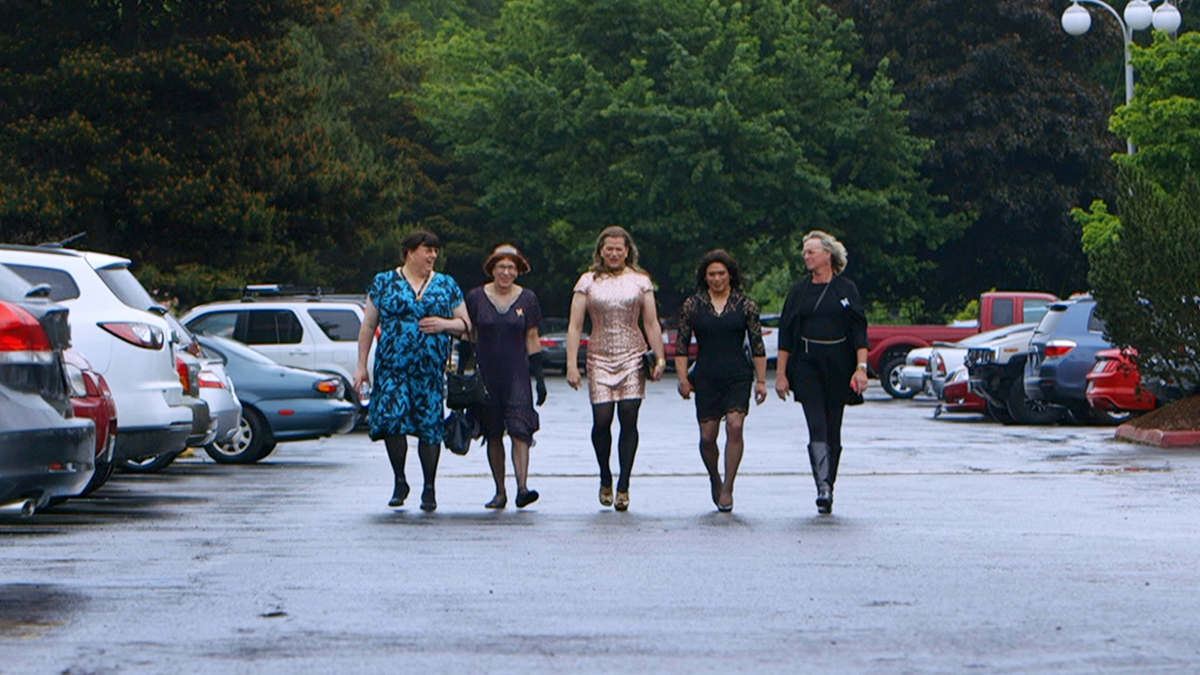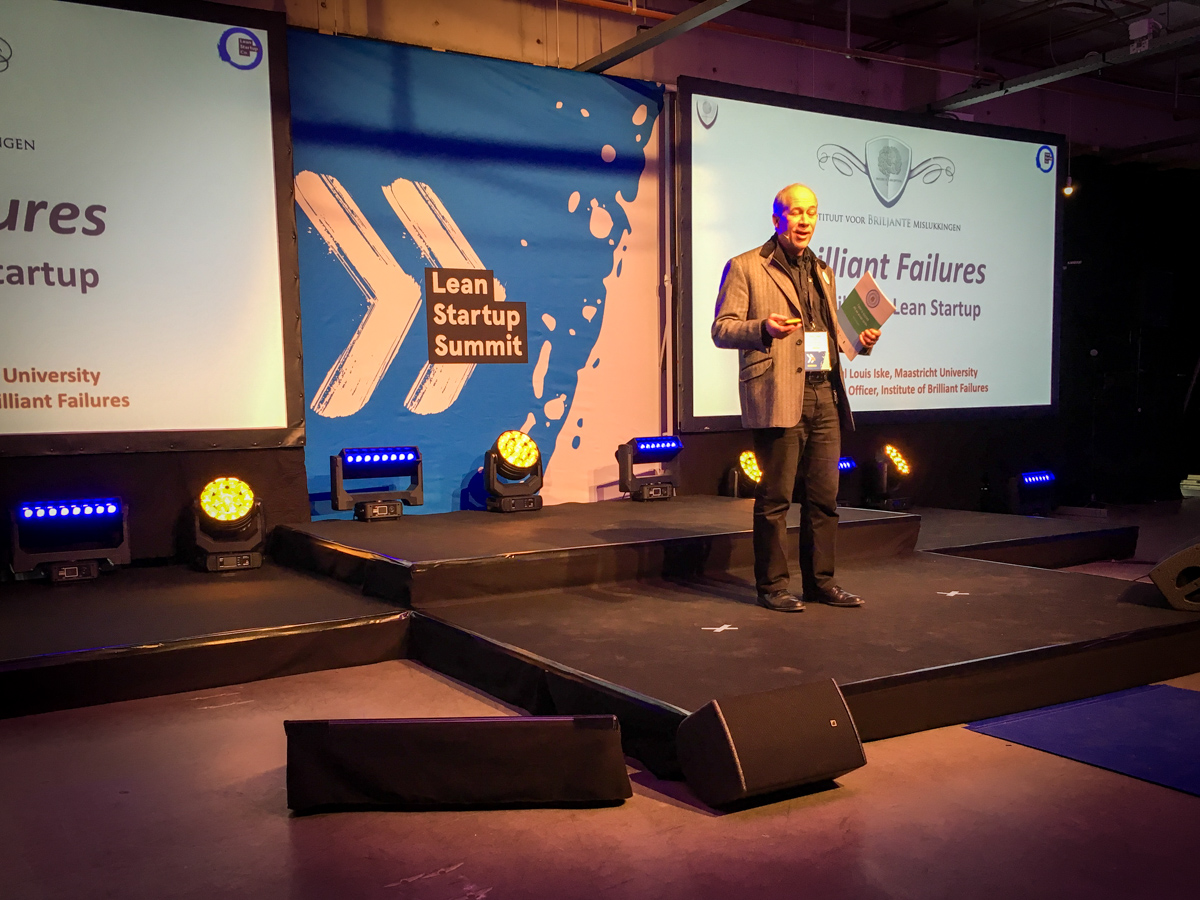"This group of women have all lived as men... Everything is in the wrong place, and everything is in the wrong size and shape, and it sucks to try to be a woman when you’ve had like 60 years of testosterone going through your veins."—Jessica Dimmock, in our interview about her documentary The Convention.
How to Write a Meaningful Future from the Contentment of an Imperfect Present
What do I want to do with my life? is one of the most basic questions of our time on Earth, as well as among the most heavyweight. It is simultaneously simple to answer and impossible to get right. We are all confronted with its gravity, and yet, despite it being a question contemplated since the dawn of thought, how to go about answering it remains rather unresolved. While, on one hand, day-to-day living seems to demand that we not fuss about with such philosophical quandaries, which can quickly devolve into a bottomless rhetorical pit of unsatisfying intellectual agony lacking in action, on the other hand, the cost for not doing so can be an even more agonizing regret. Aside from drifting into nihilism or ennui—both of which are, to me, signs of existential cowardice—is there a way to pose the question and meet with satisfaction?
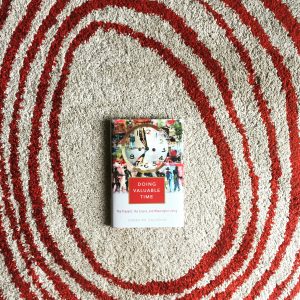 Philosophy professor Cheshire Calhoun makes her case for how to break it down in Doing Valuable Time: The Present, the Future, and Meaningful Living (Oxford University Press, 2018). “In considering how to answer that question,” she writes, “you are thinking of your life as the expanse of time you have to be alive in and that is up to you to give a shape to—or if you like, a narrative storyline. You are thinking it as a life, rather than merely a sequence of hours, days and years.” Central to her argument are two interwoven variables: time and evaluation.
Philosophy professor Cheshire Calhoun makes her case for how to break it down in Doing Valuable Time: The Present, the Future, and Meaningful Living (Oxford University Press, 2018). “In considering how to answer that question,” she writes, “you are thinking of your life as the expanse of time you have to be alive in and that is up to you to give a shape to—or if you like, a narrative storyline. You are thinking it as a life, rather than merely a sequence of hours, days and years.” Central to her argument are two interwoven variables: time and evaluation.
Time accompanies all arguments of meaning: it separates the past, present and future, as well as unifies them; it measures duration; it connects disparate events; it offers value to what we give our finite attention to; it motivates emotions like hope and anxiety. Evaluation is likewise part-and-parcel of our human experience: we determine the value of events, actions, activities, people, causes, qualities… everything. And it is through the dialogue of our evaluations across time that we form our notions of meaning.
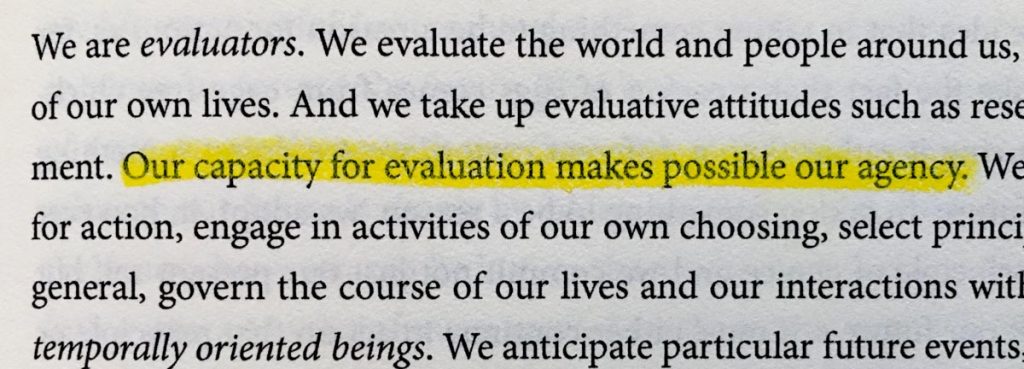
Calhoun’s argument is academic, rather than prescriptive; this isn’t a self-help guide and for the most part she doesn’t advise. This may render it rather inaccessible (by interest or complexity) to those who are not already neck deep in their own quest for the meaning of a meaningful life. Yet, what it does instead is rather more significant for those who identify as seekers: she offers a rich toolbox from which you can more expertly construct your own purpose. It also goes beyond thought and into action; the title, the seemingly clumsily worded “Doing Valuable Time,” in fact emphasizes that valuable time must be “done.” It requires not just presence but participation, one’s active doing.
However, this is where we get into territory rife with motivational speakers, and the ashes of real-world garbage fires of unfulfilled potential. When you are so inclined to believe in a thing called a “meaningful life,” and that it is not only possible to achieve but also belonging to the realm of your own agency, you set yourself up for the opposing force: the damage of a day not spent well, the vertigo of losing your step in the narrative of meaning, the failure of having your intentions and your actions misaligned. As George Orwell wrote, “A man who gives a good account of himself is probably lying, since any life when viewed from the inside is simply a series of defeats.” This is not a little thing.
What makes Calhoun’s philosophical, rather than motivational, perspective so crucially effective is that she includes these matters without particular emotional judgment; they are simply points on a geography of time that must be navigated. She deftly navigates meaning, hope, commitment, boredom, and imperfection, while simply investigating the ways in which they play a role in our evaluation of our time. In describing the various conditions for boredom, for example, a direct response to time and evaluation, she clarifies that “we should not expect that a meaningful life won’t be a boring life. Indeed, for a variety of reasons the pursuit of a meaningful life may itself generate boredom.” Further, she speaks about the role of commitment in creating a coherent narrative of our life, but hedges this by clarifying that if one makes a life from refusing to commit, that is indeed another form of authoring, and “a matter of personal style.”

Our perception of time—that is, that we experience it at all, and that we experience it in one direction—is a large part of our human experience. In the movie Mr. Nobody (2009), a sci-fi-esque approach to choosing one’s life in the constraints of a one-directional spacetime, the protagonist muses on the weight of choices: “The smoke comes out of Daddy’s cigarette, but it never goes back in. We cannot go back. That’s why it’s hard to choose. You have to make the right choice.” It is the evaluator in us who determines what is the “right” choice, yet, there is no guarantee that our evaluator will agree with that choice ten years from now, ten months from now, or even ten minutes from now. Given new information, or even a new frame of mind, we may evaluate differently. In the present, knowing what we know about the imperfection of our current mind could easily leave us in analysis paralysis.
We may feel that, if we had more information, we would be better able to choose. Yet this is not decidedly so. In Ruth Chang’s TED talk, How to Make Hard Choices, she reflects on wishing that God or Netflix would deliver to her a DVD of different paths of her life so she could compare side by side, and choose what would undoubtedly be the “right” choice. However: “It’s a mistake to think that in hard choices, one alternative really is better than the other, but we’re too stupid to know which,” she says. “Even taking two alternatives side by side with full information, a choice can still be hard. Hard choices are hard not because of us or our ignorance; they’re hard because there is no best option.” Likewise, in Mr. Nobody, the character concludes with determination, “Each of these lives is the ‘right’ one. Every path is the ‘right’ path.” He then recites a quote, which he attributes to Tennessee Williams though I haven’t been able to verify its source: “Everything could be anything else and it would have just as much meaning.”
We are then faced with the arbitrariness of meaning, which is to say that we ourselves are responsible for determining what has meaning and what does not. It is the sort of realization that allows you to see that the Grand Hotel Meaning is made of sand. This can either induce anxiety or incite play, depending on the extent to which you have confidence in your bearings. Calhoun herself does not sugarcoat it: “Leading a life is difficult. And it is difficult in ways that exceed the difficulty of making up one’s mind about what one values.”
Though Calhoun is not prescriptive in her method, as I said, there are a few conclusions she arrives at, which I think have value in forming and living your own definition of doing valuable time:
- It is wise to cultivate a motivating interest in your future. Meaning is often formed by a coherence of events that continue into the future. Planning is also a key part of this, because it activates our agency. Determining “the idea of a future in which our deepest self has a place,” and planning for it, is an act of shaping a meaningful life.
- It is a virtue to have a disposition for contentment. This is the main point that Calhoun actually does offer as advice. Conditions will never be perfect, so there will always be reasons, even unsatisfactory ones, to be discontent. By positioning your expectations to favor contentment, regardless of what is warranted, you enable a “virtue of appreciation.”
- The meaning of life can be (too) broad or (too) narrow. Whole-life characterizations (that is, what your life is about) may lose some contact with day-to-day meaning. For example, if a housewife makes her life about her role as a mother and caretaker, she may find her daily life swamped in meaningless chores, thereby losing the connection between the purpose and the entailed spending of time. On the other side of the spectrum, minute-by-minute appraisals of the meaning of your activities may mean that there is not a wider coherence to the narrative. There is local and global time, and both must be to some extent satisfied.
- Understand the origin of your reasons for meaning. Calhoun describes three main categories of reason-making: reasons-for-me, reasons-for-the-initiated, and reasons-for-anyone. The reasons-for-anyone are the reasons which you could air in public, which just about anyone could understand or agree are justified. Reasons-for-the-initiated would make sense for those who have similar values, or who are familiar with the same activities as us. Reasons-for-me, however, are idiosyncratic to your own life experience. Not everyone will understand these reasons. All three of these types of reasons have a role to play in determining meaning.
- Understand your level of commitment to a plan. This means deciding where to set the bar for the number and severity of setbacks and obstacles you’re willing to overcome in the pursuit of some end. Are you “giving it a shot” or “endeavoring”? Consider when to walk away, and when to double down. Also, consider the extent to which you’re following through with a plan simply “because no problems or more attractive options emerge.”
- Constraints, while helpful practically, can crowd out possibilities for inviting desire. When the practical questions “What do I need to do?” “What do I have to do?” and “What ought I to do?” dominate your planning, they crowd out questions like “What would be interesting to do?” Calhoun writes, “Worse, prolonged deferment of questions about what would be engaging if free of such constraints may render one unfit for later answering them.” So, make room for questions free of constraints.

Doing Valuable Time is a philosophical exercise, yet one with immensely practicable thoughts and concerns. While many of us are concerned with our ability “to do something interesting with time,” as put by Pierre Liebaert in our interview, Calhoun succeeds in breaking down the component parts of this. What does time mean to us? What does value mean to us? What does it mean to take action (or not)?
For those who are inclined towards anxiety and self-punishment, this book may only add fuel to the fire of feeling insufficient at living. Yet, I found it an encouraging and informing book. Our attempts to understand meaning often result in more confusion, which I believe is because we encounter conflicting reasons, or sources, or desires. But, by being able to articulate all these factors at play, we are better equipped to understand those conflicts, and choose more nuanced narratives for ourselves. When we feel empowered, we are less inclined to wash our hands of the whole affair, or to give up. We are emboldened to choose, and to do.
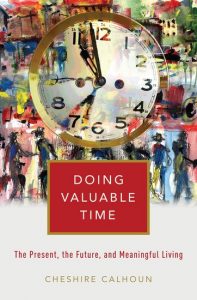 Doing Valuable Time is published by Oxford University Press. Learn more about author Cheshire Calhoun on her website.
Doing Valuable Time is published by Oxford University Press. Learn more about author Cheshire Calhoun on her website.

